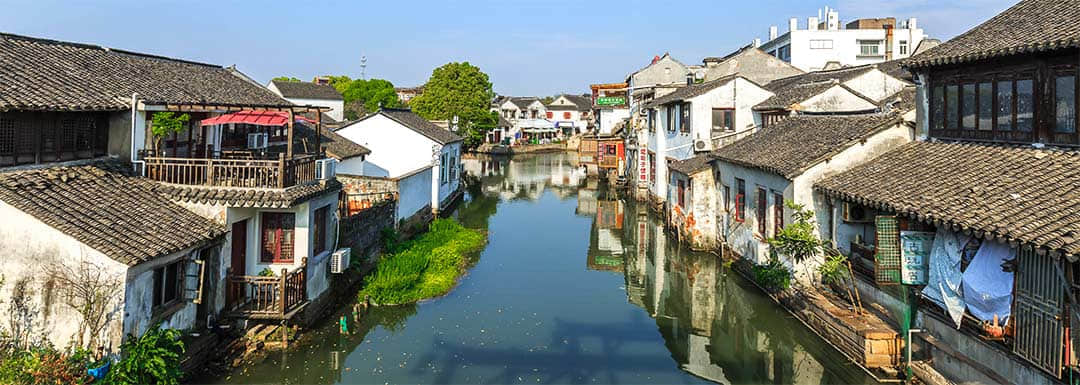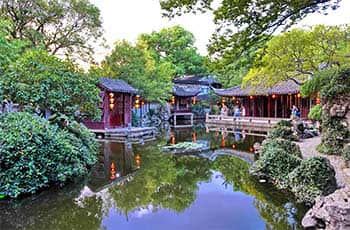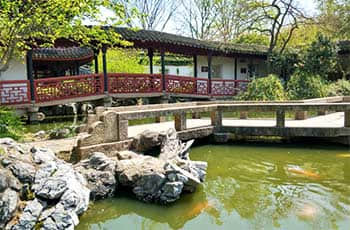Tongli Water Town

Situated in Wujiang District of Suzhou, Tongli Water Town is 18 kilometers from downtown Suzhou, and 80 kilometers from Shanghai. Surrounded by water, the picturesque Tongli Water Town is divided by 15 rivers into 7 islands which are then connected by 49 bridges. Every house in the town faces water and can be reached by boat. The dwellings in the town built during the Ming and Qing Dynasties stand close together in alignment, and the bridges built in the Song, Yuan and Ming Dynasties are well-preserved. In 1982, Tongli Water Town became the first and only ancient town where the town as a whole was listed as major historical and cultural site protected at the national level.
- Chinese name: 同里 tónɡ lǐ
- Duration: 1 day
- Entrance fee: RMB 100. The ticket is valid for no more than two days at most.
1. Visitors who plan to stay overnight have to declare when buying the tickets and get the tickets stamped at the ticket office.
2. One can enter the town without a ticket from 18:00 to 6:00 the next morning, but can not visit any of the scenic spots inside without a ticket.Opening hours: 7: 30-21: 00 - Best time to visit: All year round
- Address: Tongli Town, Wujiang District, Suzhou City
- How to get there:Suzhou Railway Station, Southern Bus Terminal and Wu County Bus Terminal all have nonstop scheduled trains and buses to Tongli Water Town. It takes about 35 minutes and RMB 8 to get there.
Highlights of Tongli Water Town
In spring, the drizzling spring rain and mist in Tongli Water Town makes the landscape there all the more appealing. In summer, with the temperature going up, a lot of activities and events about folk customs will be held, for example, holding a fire fighting competition called Zhashuilong in late June, burning incense and releasing lanterns on the river in late July, and newly-married women that year come back to their parents’ home in early August which is called Tongtonggu. In autumn, as the Osmanthus are in full blossom, the town is filled with sweet fragrance, and the sky is very blue. It’s the best season to visit Tongli Water Town. The winter in the town is not very cold. With fewer visitors, you can better appreciate the beauty of the peacefulness of this town, and enjoy your leisure time here. As quite a lot of visitors will come here at weekends or on holidays and festivals, it is not wise to pay a visit to the town at such busy times when you can hardly appreciate the beauty and quietness of Tongli Water Town.
Recommended Scenic Spots
 Tuisi Garden
Tuisi Garden 1. Tuisi Garden
Covering an area of only 9.8 mu (about 6,500 sq m), Tuisi Garden is simple but elegant, featuring the architectural style of gardens south of the Yangtze River in the late Qing Dynasty. The layout of the garden is quite extraordinary as different forms of Chinese architecture surround a pond at the center, looking as if all the architectural pieces are floating on the water. At weekends, the garden is open until nighttime. The night scene is so unique and inviting that you won’t want to miss it.
2. Three Bridges
The Three Bridges, namely Taiping Bridge, Jili Bridge and Changqing Bridge, are treasures of bridges in Tongli Water Town. Built separately in the Ming and Qing Dynasties, the three bridges together formed the Chinese character “品” which crosses over the junction of three rivers and forms a circular path. Boats come and go on the river, while people walk up and down over the bridges, presenting a unique and vibrant picture.
It’s a tradition that the locals must cross the Three Bridges when the they are one-month old, or get married, or have their 60th birthday. As an adage goes, ‘crossing Taiping Bridge makes you healthy all year round; crossing Jili Bridge makes your business prosperous; and crossing Changqing Bridge makes you stay young forever’.
3. Chongben Hall
 Pearl Pagoda
Pearl Pagoda The most appealing part of Chongben Hall is its carvings of various patterns. If Tongli Water Town is compared to a museum of ancient architecture, then Chongben Hall is definitely an exquisitely-carved one in the museum. The skillful techniques and profound cultural connotations it reflects will leave a great impression on visitors.
4. Pearl Pagoda
The Chen family’s old mansion in Wuxi Opera, Pearl Pagoda, is a reflection of Pearl Pagoda. Pearl Pagoda is actually not a pagoda but the garden of a senior official. Pearl Pagoda is the largest garden in Tongli Water Town, where you can find mountains, rockeries, water and schools of fish.
5. Jiayin Hall
Built in the early years of the Republic of China at the corner of Youjia Alley of Zhuxing Street, Jiayin Hall has four courtyards, and the doors and windows of the hall are exquisitely carved. The main building in Jiayin Hall is an imitation of architecture in the Ming Dynasty, which is called Shamao Hall.
Drop us a line and we'll connect you with the top China expert in no time!